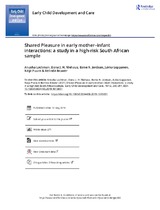| dc.contributor.author | Lachman, Anusha | |
| dc.contributor.author | Niehaus, Dana J. H. | |
| dc.contributor.author | Jordaan, Esme R. | |
| dc.date.accessioned | 2021-11-10T12:37:45Z | |
| dc.date.available | 2021-11-10T12:37:45Z | |
| dc.date.issued | 2021 | |
| dc.identifier.citation | Lachman, A. et al. (2021). Shared pleasure in early mother–infant interactions: A study in a high-risk South African sample. Early Child Development and Care, 191(2), 230-241. https://doi.org/10.1080/03004430.2019.1613651 | en_US |
| dc.identifier.issn | 1476-8275 | |
| dc.identifier.uri | https://doi.org/10.1080/03004430.2019.1613651 | |
| dc.identifier.uri | http://hdl.handle.net/10566/7003 | |
| dc.description.abstract | Infant mental health is strongly connected to an infant’s relationship with a
responsive, warm, and available caregiver. However, maternal mental
illness reduces a mother’s ability to detect and respond to changes in
her infant’s expressions and communication, which may have important
consequences for infant attachment and emotion regulation. The Shared
Pleasure (SP) paradigm in parent–infant interactions is defined as ‘the
parent and the child sharing positive affect in synchrony’ and is
considered to be a possible screening marker for early identification of
at-risk dyads. A paucity of data exists for the application of SP as a
measurable paradigm in developing countries. This study aimed to
evaluate the SP paradigm using women attending a tertiary psychiatric
maternal mental health clinic in Cape Town, South Africa. | en_US |
| dc.language.iso | en | en_US |
| dc.publisher | Routledge | en_US |
| dc.subject | Infant | en_US |
| dc.subject | Shared pleasure moments | en_US |
| dc.subject | Mother–infant interactions | en_US |
| dc.subject | Maternal mental illness | en_US |
| dc.subject | South Africa | en_US |
| dc.title | Shared pleasure in early mother–infant interactions: A study in a high-risk South African sample | en_US |
| dc.type | Article | en_US |

